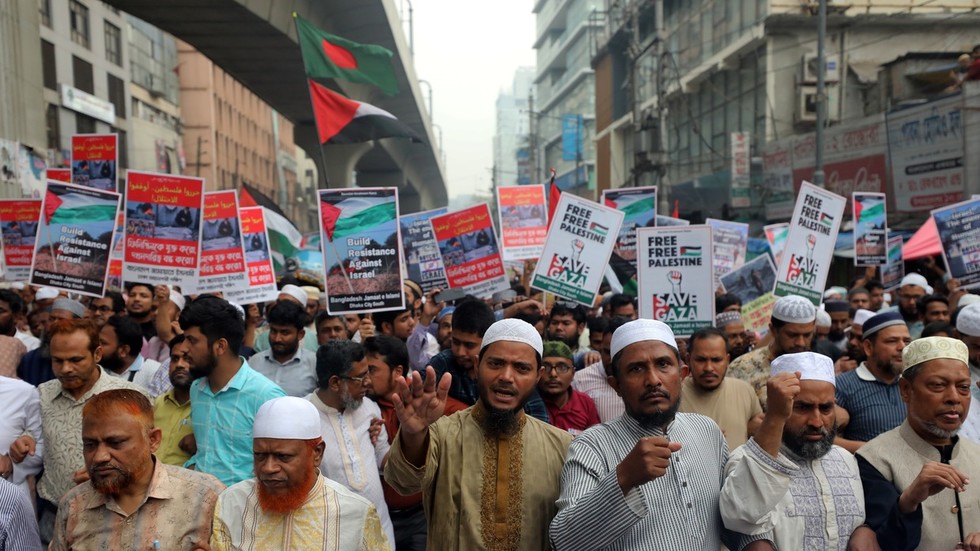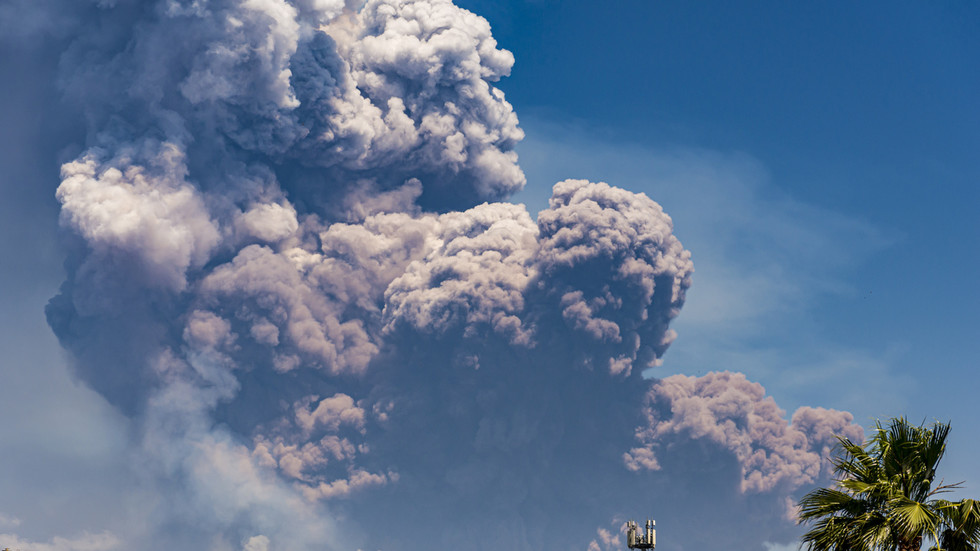India and Pakistan cancelled visas for their respective citizens to each other’s countries on Thursday, and Islamabad retaliated after New Delhi suspended a water-sharing treaty, the Indus Waters Treaty, between the two nations.

The downgrade in diplomacy between the two nations comes after a tourist attack in India, for which officials have blamed Pakistani militants.
On Tuesday, a gunman opened fire in the heavily disputed region of Kashmir, killing 26 people, most of whom were tourists, making it the deadliest attack on civilians in the area in recent times.
2:28
Deadly attack on resort in Kashmir’s Pahalgam sparks wave of protests across India

No group has formally taken responsibility for the attack.
Story continues below advertisement
The fallout
In response, India said it would revoke all visas issued to Pakistani nationals as of Sunday and ordered Pakistanis currently in the country to leave before then.
It also announced that it was cutting diplomatic staff, closing the only usable land border crossing between India and Pakistan and suspending a key water-sharing treaty.
In retaliation, Pakistan shut down its airspace for all Indian-owned or Indian-operated airlines and suspended all trade with India, including to and from any third-party country.
Indian Defence Minister Rajnath Singh pledged Wednesday to “not only trace those who perpetrated the attack but also trace those who conspired to commit this nefarious act on our soil,” and hinted at the possibility of military strikes, according to The Associated Press.
Pakistan’s National Security Committee condemned India’s “belligerent measures.” It said that while Pakistan remained committed to peace, it would never allow anyone to “transgress its sovereignty, security, dignity and inalienable rights.”
Government ministers on both sides have hinted that the dispute could escalate to military action. Pakistan’s Foreign Minister Ishaq Dar told local Dunya News TV channel that “any kinetic step by India will see a tit-for-tat kinetic response.”
New Delhi describes all militancy in Kashmir as Pakistan-backed terrorism. Pakistan denies this, and many Muslim Kashmiris consider the militants to be part of a homegrown freedom struggle.
Story continues below advertisement
During a speech on Thursday, India’s Prime Minister Narendra Modi promised to find those responsible for the attack.

Get daily National news
Get the day's top news, political, economic, and current affairs headlines, delivered to your inbox once a day.
“We will pursue them to the ends of the earth,” he vowed.
Why Kashmir matters
Kashmir, which is located in the northernmost region of the Indian subcontinent, is currently divided between India and Pakistan, each controlling about half of the territory with both claiming it in full. China also exercises jurisdiction in eastern Kashmir.
The Himalayan region became an entrenched area of contention in 1947 when both countries gained independence from British rule, leaving Kashmir free to choose which country it would join, if any.
At the time, its leader, the Maharaja of Kashmir, Hari Singh, wanted it to remain independent, though he signed an interim “standstill agreement” with Pakistan to maintain the status quo and uphold transport and other services.
Story continues below advertisement
Shortly thereafter, he chose to take military assistance from India when a Pakistani-led rebel invasion, spurred in part by the Maharaja’s lack of decision-making, caused widespread disruption.
Lord Louis Mountbatten, former governor general of India, stepped in and suggested as a temporary peace measure that Kashmir join India, followed by a vote to ratify its official status. Hari Singh signed the Instrument of Accession agreement shortly after, handing control of its foreign and defence policies over to India.
Trending Now
1:17
Gunmen open fire on tourists, killing at least 20 people at Kashmir resort

Indian troops proceeded to take two-thirds of the territory, with Pakistani forces exercising control over the remaining northern region.
Whether Indian forces entered Kashmir before or after Hari Singh signed the agreement remains in dispute between India and Pakistan.
India argues that Hari Singh signed first, legitimizing the presence of their troops, but Pakistan argued that the Maharaja did not sign before Indian troops entered Kashmir and that he and India had therefore bypassed the “standstill” agreement with Pakistan.
Story continues below advertisement
Neither country has veered from its position in decades, though some Kashmiris vie for independence, a solution that neither Pakistan nor India is willing to consider.
Numerous wars have been fought between Pakistan and India over Kashmir since 1947, including in 1947-1948, 1965, 1971, and 1999, according to National Geographic.
What is the Indus Waters Treaty?
The nuclear-armed neighbours disagree over use of the water from rivers that flow downstream from India into the Indus river basin in Pakistan.
The Indus Waters Treaty, mediated by the World Bank and signed by the neighbours in September 1960, split the Indus and its tributaries between the two countries and regulated water sharing. India was granted the use of water from three eastern rivers — Sutlej, Beas and Ravi — while Pakistan was granted most of the three western rivers — Indus, Jhelum and Chenab.
There is no provision in the treaty for either country to unilaterally suspend or terminate the pact, which has clear dispute resolution systems.
Pakistan is heavily dependent on water from this river system for its hydropower and irrigation needs. Pakistan says India unfairly diverts water with the upstream construction of barrages and dams, a charge India denies.
Pakistan is concerned that India’s dams will cut flows on the river, which feeds 80 per cent of its irrigated agriculture.
Story continues below advertisement
India has accused Pakistan of dragging out the complaints process, and says the construction of its Kishanganga and Ratle hydroelectric projects is allowed under the treaty. It has also sought modification of the pact to get around such delays.
The suspension of the accord is not expected to have an immediate impact on the flow of water to Pakistan as India does not have enough storage capacity, but India’s move could bring uncertainty for Pakistan’s agricultural system.
The suspension means India can stop sharing crucial information and data on release of water from barrages/dams or on flooding, Indian officials said, adding that New Delhi will also not be obliged to release minimum amounts of water during the lean season.
—
— With files from the Associated Press and Reuters











 English (US) ·
English (US) ·